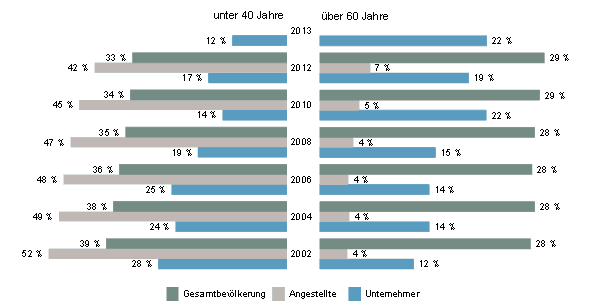Germany is stuck in the demographic trap: population figures are falling. As a result, the average age is rising. Small and medium-sized enterprises are not immune to this development. In fact, SME entrepreneurs are ageing much faster than the population as a whole. This is shown by a recent study by the KfW.
The proportion of entrepreneurs over 60 has risen rapidly over the past ten years. Meanwhile, fewer and fewer young entrepreneurs are taking their place. This means that after the shortage of skilled workers, the Federal Republic is now also threatened by a shortage of entrepreneurs. For many professionally qualified candidates, a secure permanent position is often more attractive than the risky takeover of a company.
Alongside the shortage of skilled workers, there is a threat of a shortage of entrepreneurs
For it becomes clear: In 2002, only 12 % of the owners or shareholders of a medium-sized company were over 60 years old. In only 11 years, their share rose by 10 percentage points to 22 %. At the same time, fewer and fewer young entrepreneurs are taking over. There is a lack of young talent.
The share of entrepreneurs under 40 years of age fell from 28 % in 2002 to only 12 % in 2013. This dramatic reduction is consequently equivalent to an increase in the average age of entrepreneurs from 45 to 51 years. Thus, SME entrepreneurs are ageing much faster than the German population: the share of Germans over 60 years of age increased by only one percentage point from 28 to 29 % in the same period.
Lack of business successors and less impetus for the national economy
This ageing could therefore have dramatic consequences for the future development of the German economy, which is dominated by small and medium-sized enterprises. Older entrepreneurs are characterised by their experience, their expertise and a high degree of identification with the company. Entrepreneurs over 60 have on average 43 years of professional experience and are not at all interested in retirement at 63. At 29 percent, the share of entrepreneurs over 60 is more than four times higher than that of employees in the same age group.
Investment backlog looms in German SMEs
dangers loom and older entrepreneurs are usually less willing to invest than younger ones. As a result, there is a real danger of an investment backlog in German SMEs and a loss of innovative capacity in global competition. For the Memmingen-based management consultant specialising in company successions Norbert Lang the consequence is clear: ‘Senior entrepreneurs are also in a battle for the best brains when it comes to finding their company successor. For this reason, the preparation of one’s own company succession should be planned as an independent strategic project within the company?
Please also read the Comment from Ingo Claus.
You might also be interested in this:
Free webinars on business succession
Interview: Preparing the succession within the family well
How do you find reputable business sale advisors?
Lack of business successors threatens family businesses
Company successions in East Westphalia and Bielefeld are on the rise

